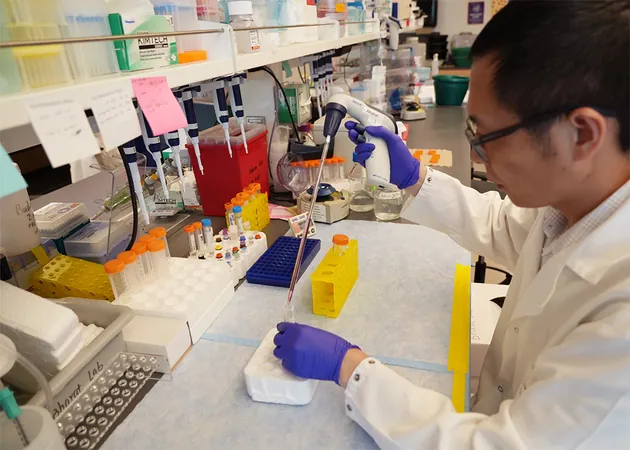
Unbelievable New Connection Discovered Between COVID-19 and Cancer Treatment Breakthrough!
2024-11-18
Author: Nur
A groundbreaking study from Northwestern Medicine's Canning Thoracic Institute, recently published in The Journal of Clinical Investigation, has unveiled a shocking relationship between COVID-19 infection and the surprising regression of certain cancers. This new discovery might revolutionize cancer treatment as we know it!
In an unexpected finding, the researchers discovered that RNA from the SARS-CoV-2 virus, which causes COVID-19, can provoke the formation of a novel immune cell type, termed inducible nonclassical monocytes (I-NCMs). These powerful cells exhibit remarkable anti-cancer properties by actively targeting and attacking cancer cells. This could explain the peculiar instances where some patients have seen a reduction in their cancer symptoms following a COVID-19 infection.
Dr. Ankit Bharat, MD, chief of Thoracic Surgery and director of the Canning Thoracic Institute, explained, “This discovery opens up an entirely new strategy for treating cancer. We observed that the immune cells activated by severe COVID-19 could be triggered through a specific drug to combat cancer. Initial studies have indicated a positive response in melanoma, lung, breast, and colon cancer.” However, it is crucial to note that these findings are in the early stages and have primarily been assessed in preclinical animal models.
The research, utilizing both human tissues and animal models, indicated that these unique immune cells could potentially be stimulated pharmacologically using small molecules, presenting a new therapeutic option for cancer patients, particularly those facing aggressive or advanced cancers where traditional treatments have fallen short.
How COVID-19 Could Equip the Body to Battle Cancer
The study highlights a fascinating mechanism where a subset of immune cells can be triggered during COVID-19 infections. The process kicks off as the virus’s RNA activates key signals within the immune system. This prompts standard monocytes – a common type of white blood cell – to transform into I-NCMs, which are specially adapted to engage cancer cells actively.
Dr. Bharat elaborated, “What sets these cells apart is their dual function. Normally, non-classical monocytes circulate in blood vessels and lookout for threats but are unable to invade tumor sites. The I-NCMs generated during severe COVID-19, however, possess a receptor called CCR2 that grants them access to the tumor environment. Once inside, they release chemicals that summon the body's natural killer cells to swarm the tumor and initiate an attack on the cancer cells.”
What's Next?
Despite the promising nature of this research, Dr. Bharat emphasizes that further investigations are necessary before this approach can be applied in clinical settings. “We are in the initial phases, but the potential to redefine cancer treatment is immense. The next steps involve conducting clinical trials to evaluate the safety and efficacy of utilizing these findings for cancer patients,” he stated.
The research could play a pivotal role within the Canning Thoracic Institute’s Double Lung Replacement and Multidisciplinary Care (DREAM) Program, a groundbreaking clinical initiative providing double-lung transplants to patients with advanced lung cancers that haven’t responded to conventional therapies. Remarkably, over 40 patients have undergone double-lung transplants through this innovative program.
“While the DREAM Program has seen fantastic success, we do expect some patients may face recurrence,” Dr. Bharat noted. “By leveraging our research on monocytes, we could treat DREAM patients without imposing a rejection risk on their new lungs.”
This groundbreaking discovery presents a thrilling new frontier in the fight against cancer, offering hope to countless patients who find themselves out of options. As research progresses, it may just reshape the landscape of cancer treatment for good. Stay tuned for updates on the clinical trials – this could be the key to unlocking a new era of cancer therapy!

 Brasil (PT)
Brasil (PT)
 Canada (EN)
Canada (EN)
 Chile (ES)
Chile (ES)
 España (ES)
España (ES)
 France (FR)
France (FR)
 Hong Kong (EN)
Hong Kong (EN)
 Italia (IT)
Italia (IT)
 日本 (JA)
日本 (JA)
 Magyarország (HU)
Magyarország (HU)
 Norge (NO)
Norge (NO)
 Polska (PL)
Polska (PL)
 Schweiz (DE)
Schweiz (DE)
 Singapore (EN)
Singapore (EN)
 Sverige (SV)
Sverige (SV)
 Suomi (FI)
Suomi (FI)
 Türkiye (TR)
Türkiye (TR)